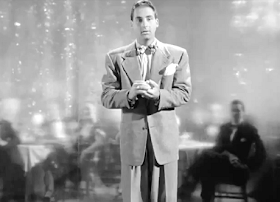Mankiewicz Moment: The point in time in which one identifies the brilliance of a movie or
part of a movie long after having seen it. Antonym: Icebox Moment.
Joseph Mankeiwicz' clever
movie plots bear repeat viewings and are worth appreciating. You're so busy enjoying his film, that
you're not always aware of the mechanisms which bring you that
pleasure.
Take for instance Bill Sampson's (Gary
Merrill) first big speech in All About Eve (1950). It's a
long, drawn out affair about what constitutes theater. To be frank, after
having seen it the first time I fast forward past it during every subsequent
viewing.
I believed the scene was filler, the
screenwriter hammering home his personal feelings through a long-winded character.
[Mankiewicz does this as well with Kirk Douglas' character in A Letter to Three Wives (1949) on the
subjects of teachers' salaries and dim-witted radio programs.]
But Mankiewicz is more than just
killing time with Bill, he's setting up our leading man's character and
fidelity.
The Scene
While waiting backstage for his love
interest - star of the theater Margo Channing (Bette Davis) - to finish dressing so that she will escort
him to the airport, Bill Sampson - on his way to direct a film in Hollywood -
spouts off a long monologue to devoted Margo fan Eve Harrington (Anne Baxter)
about what constitutes theater.
It's a perplexing few lines, not for
its content but for the fact that it exists at all. Why do we stop the
movie for two interminable minutes to talk about what is theater? Surely Margo could have been ready to leave and
Bill and Margo could have marched to the cab for the airport. End Scene.
What is the purpose of this scene?
It has bugged me for a while now. I did a bit of reverse engineering, then I
finally had my Mankiewicz Moment. The
brilliance of his plot-making actually does three very important things for
Bill.
1.This Scene Shows Bill's
Personality
The first scene between Bill and Eve gives us a rough sketch
of Bill's character and focus. Within fifteen minutes of running time,
the leading man is hurriedly introduced, and whisked away to the airport, not to
be seen again by the audience for a few minutes, nor by the other characters
for months. We have to know the kind of man he is quickly before the plot
quarantines him in California.
The monologue tells you his mind is thoroughly
in show business. If he's in love with anything other than Margo, he's in love
with his job.
2. This Scene Underscores Bill's
Fidelity to Margo
The story hinges on whether the
aspiring actress, Eve, is after Margo’s career and her man and how successful
will she be at both. Bill’s participation in any hanky panky would seriously
devalue him with the audience – he would not be worthy of our leading lady. The
story must protect him.
Thus, the monologue in Margo's
dressing room when Bill and Eve are alone together is
strictly a platonic setting for Bill. He even refers to her as a "kid." The
speech gives us a glimpse of the innocuous kind of conversation Bill would have
when he's with a neophyte in the business. This is necessary in preserving
Bill's reputation with the audience as a director who's only interested in his
business and not in philandering with every eager young thing out there who wants
a shot at acting.
The next time Bill and Eve are alone
together is in Margo's living room waiting for Bill's birthday party to begin.
Bill has returned from directing films in Hollywood and is regaling Eve with
cinema stories. You'll notice in both times that he's alone with her, he's
waiting for Margo, who is always only a few feet away. This, as opposed to meeting
Eve alone in a restaurant or some other shady rendezvous.
By this time, Margo incorrectly
suspects Bill of having an affair with Eve. The audience knows he's not. The
earlier monologue saves him with us, even if Margo believes he's cheating on
her.
3.This Scene Contrasts the Final,
Antagonistic Scene Between Bill and Eve
The earlier two scenes with Bill and
Eve are that of mentor and student from Bill's (and the audience's) viewpoint.
The third and final scene they have together alone strikes a different tone, but
really does similar things as the second Bill and Eve scene – it affirms Bill’s
faithfulness to Margo.
When Margo is out of town and misses
a curtain, the director goes backstage to congratulate Eve - now Margo's
understudy - for her performance.
It's not clear whether Eve knows
that Bill and Margo have dissolved their relationship by this point. What is
evident, however, is that the ingénue takes advantage of Margo's temporary
absence to intimate having an affair with Margo's man. Bill - shocked - refuses her advances.
This last Bill and Eve scene
reaffirms what the audience has thought since the first scene - Bill is the
innocent lamb, completely unaware of the danger surrounding him. This virtue
undergirds Bill's fidelity to Margo and makes their later reconciliation that
much sweeter.
------------
We know that Bill is worthy of his leading lady because we've seen him behave consistently platonic with other women even when Margo isn't around. That first
long-winded scene in the dressing room with Eve - the one I initially
believed to be completely superfluous - actually saves Bill's reputation
with the audience because it establishes his pattern of fidelity.
What’s your Mankiewicz Moment? Have you revisited a ho-hum scene from a
movie and suddenly realized that it is brilliant?









































